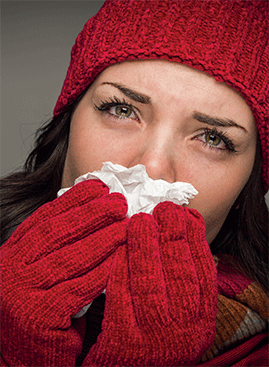
Beat those bugs
Get ready for the onslaught of coughs and colds as the colder months come our way. Here’s how...
Autumn rush
Jill Bell of Well and Good in Midleton, Co Cork: “With the start-up of the school and college year many parents are wary about students sharing air and bugs in a classroom. This concern applies particularly to little ones in crèches who are especially vulnerable to the spread of infection which their immune systems haven’t previously encountered. Concern about avoiding unnecessary antibiotic use is growing and health stores have plenty of tried and tested options on offer.”
Hannah Dare of Organico: “We get a lot of parents looking for advice when the school term starts – especially if the weather is poor. Coughs seem to be particularly hard to manage; I think it is very hard to hear your child coughing. We also get a lot of customers looking for advice for chronic sinus problems; sinus infections can be very hard to shift and can make people feel very debilitated.”
Coughs and colds
Jill Bell: “Vitamin C is an old and well-proven enemy of coughs and colds for all ages, and in recent years knowledge of the properties of vitamin D has spread like wildfire. Once days shorten many people use D both to strengthen immunity and cheer themselves up! Manuka honey (the genuine clinically assessed brands) and propolis from bees are well-established remedies for coughs and many people use the honey on an ongoing basis.”

Child support
Hannah Dare: “For kids elderberry syrup can be excellent, as can olive leaf syrup, and there are a few chewable natural vitamin Cs that can be very effective.”
Jill Bell: “The most popular immune booster for adults is still echinacea. It is such a pity that we can no longer recommend echinacea for under-12s, given that there were no serious issues arising from its use, but other immune supports such as elderberry and olive leaf extract do the job.”
Immune support
Jill Bell: “Less well-known but very effective immune-boosting supplements include mushrooms such as reishi and the South American fruit camu camu which has amazingly high levels of vitamin C.”
Alice Bradshaw DN Med and nutritional advisor to Solgar: “Specific nutrients such as vitamins A, C and D3, zinc and selenium play especially critical roles in maintaining the normal function of the immune system. Typically the se can be found within a good multivitamin and mineral formula. Many people choose to top up with additional vitamin D3 during the colder months as this has specifically been shown to protect against ‘flu. There are numerous herbs and botanicals that have been shown to possess antiviral, antibacterial and immunostimulatory effects – these include astragalus, elderberry, echinacea and olive leaf. Although traditionally considered a sports supplement, there is evidence that whey protein powder has immune-boosting properties.”
Sinusitis
Hannah Dare: “In the case of chronic sinusitis, I particularly like to try a strong garlic supplement, preferably an aged supplement. I would also make sure they were using a neti pot regularly, and would discuss diet, for example cutting out dairy. I would also suggest a good acupuncturist. If someone was getting a lot of viral infections or couldn’t shift a particularly nasty infection I would suggest a beta glucan supplement alongside echinacea, vitamin C and elderberry.”
Role of diet
Jill Bell: “A healthy diet is the basis of an effective immune system. If we over-indulge in sweet treats and processed foods which have never been near the soil, it’s like filling a petrol tank with dirty fuel – nothing will work as well as it should.”
Alice Bradshaw: “Real, whole foods are powerful boosters of the immune system. Focus on colourful vegetables and fruits as these are the most phytonutrient-rich foods on the planet. Beetroot, berries, red peppers, plums, apricots and all dark green vegetables are great examples of dietary immune boosters. They’re rich in vitamins and minerals as well as antioxidant compounds. Nuts and seeds and oily fish, such as wild salmon and mackerel will provide essential fatty acids.”
Recipe: Carrageen drink
This drink made from dried seaweed sold in health stores is very soothing and can really help if a child is coughing a lot at night. For kids I make a drink that is 50:50 carrageen syrup and a mango/apple juice which is sweet enough to cover the taste!
Ingredients:
- Carrageen moss – a good handful of the dried seaweed (about 5g)
- 1 organic un-waxed lemon
- 1tsp manuka honey or local honey per person
- 1 pint cold water (preferably spring water or filtered water)
Method:
1. Juice your lemon. Put the carrageen moss into a medium stainless steel pan, add water to cover, add the skin of the lemon if it is organic, and simmer for 5 minutes. Add the lemon juice. To serve, strain into a large mug and add honey to taste. Keep the pan near the stove and heat up more as needed.
2. You can also add sage leaves or thyme leaves – sage is good for sore throats and thyme for chesty coughs.
Drink as often as you need to – three to four mugs a day while you are feeling under the weather always works for me!
Courtesy of Hannah Dare www.organico.ie
Click here to read earlier Rude Health Magazine natural health articles.
Click here to read the latest issue of Rude Health Magazine.